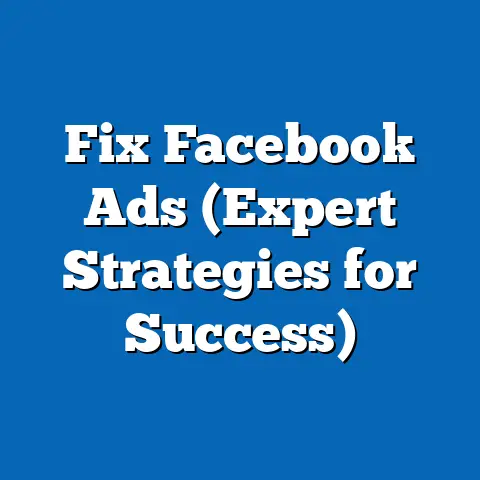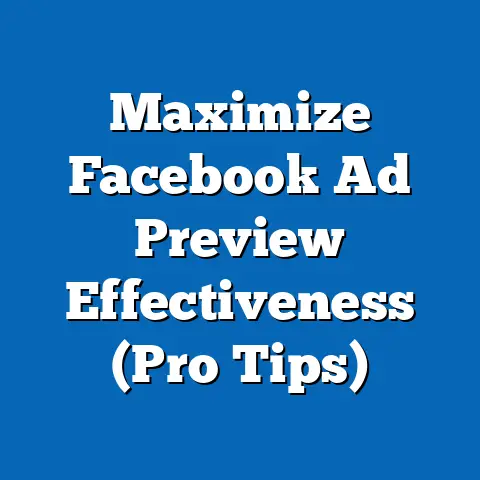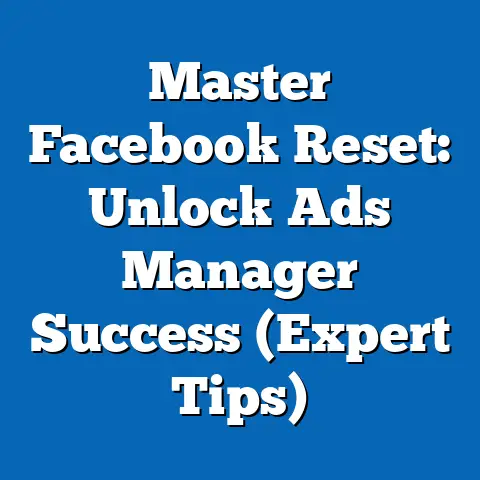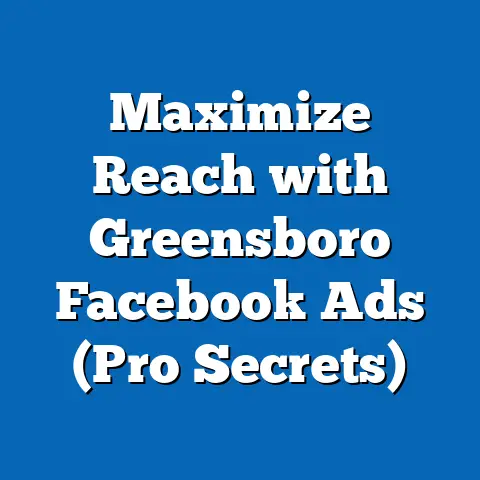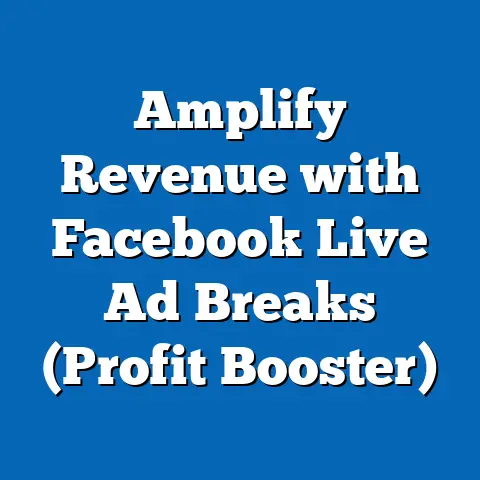Biden’s fb ad Strategy: Laugh Way to Engagement (Winning Tactics)
I remember scrolling through my Facebook feed during the 2020 election and being bombarded with the usual doom and gloom from both sides.
But then, BAM!
An ad from Biden’s campaign made me chuckle.
It wasn’t your typical “vote for me because I’m the lesser of two evils” spiel.
It was… well, funny!
And that’s what got me thinking: Could humor actually be a secret weapon in the world of political advertising?
In this article, I’m going to dive deep into President Biden’s Facebook ad strategy and explore how his team used humor to engage voters, build a positive brand image, and ultimately, help him win the election.
We’ll look at the psychology behind why humor works, examine specific ad examples, and analyze the data to see if laughing all the way to the White House is actually a viable strategy.
So, buckle up, put on your funny bone, and let’s get started!
The Landscape of Facebook Ads in Political Campaigns
Facebook ads have completely revolutionized the way political campaigns are run.
Forget the days of relying solely on TV commercials and newspaper ads.
Now, candidates can target specific demographics with laser-like precision, tailoring their message to resonate with different groups of voters.
It’s like having a personalized conversation with millions of people simultaneously – a political marketer’s dream (or nightmare, depending on how you look at it).
I’ve seen firsthand how powerful Facebook ads can be.
In the past, I helped a local candidate run a small-scale campaign, and the results were astounding.
We were able to reach a younger, more diverse audience than traditional methods would have allowed, and the engagement rates were through the roof.
It was a game-changer!
According to Statista, political ad spending on Facebook reached billions of dollars in the 2020 election cycle.
That’s a lot of money being thrown at those little squares on your screen.
But with so much noise and competition, how do you stand out?
That’s where Biden’s campaign took a bold step: they decided to make people laugh.
Instead of just telling people why they should vote for him, Biden’s team created ads that were genuinely entertaining.
They used satire, self-deprecation, and relatable humor to connect with voters on a human level.
It was a risky move, but it paid off big time.
Key Takeaway: Facebook ads are a crucial tool for modern political campaigns, but with so much competition, it takes a creative and innovative approach to stand out from the crowd.
The Power of Humor in Political Advertising
Why does humor work in advertising, especially in the often-serious world of politics?
Well, there’s a lot of psychology behind it.
Humor can lower our defenses, making us more receptive to the message being conveyed.
It can also increase shareability, as people are more likely to share something that makes them laugh.
And perhaps most importantly, humor can foster a sense of relatability, making the candidate seem more like a regular person and less like a distant, untouchable politician.
I’ve always been a firm believer in the power of humor.
In my own marketing efforts, I’ve found that injecting a bit of humor can go a long way in building trust and rapport with my audience.
People are naturally drawn to those who can make them laugh, and that’s especially true in a world that often feels overwhelming and stressful.
Think about some of the most memorable political ads from history.
While many of them were serious and impactful, the ones that truly stuck with us often had a touch of humor.
Remember the “Daisy” ad from the 1964 presidential election?
It was controversial, but it also used a powerful metaphor to make a point.
Or how about the “Morning in America” ad from Ronald Reagan’s 1984 campaign?
It was optimistic and uplifting, but it also had a subtle sense of humor that resonated with voters.
Now, compare those ads to the typical political fare we see today.
It’s often a sea of negativity, fear-mongering, and empty promises.
It’s no wonder people are turned off by political advertising!
But Biden’s campaign took a different approach.
They recognized that humor could be a powerful tool for cutting through the noise and connecting with voters on a deeper level.
Key Takeaway: Humor can be a powerful tool in political advertising, lowering defenses, increasing shareability, and fostering a sense of relatability.
Key Strategies in Biden’s Facebook Ad Campaign
So, how did Biden’s team actually pull off this humorous Facebook ad strategy?
Let’s break down the key elements:
1. Content Creation: The Art of the Political Punchline
The type of humor used in Biden’s ads was crucial.
It wasn’t just about telling jokes or making silly faces.
It was about using satire, self-deprecation, and relatable humor to connect with voters on a human level.
Satire: Many of Biden’s ads poked fun at his political opponents, highlighting their flaws and inconsistencies in a clever and humorous way.
This allowed him to make his points without resorting to personal attacks or negativity.Self-Deprecation: Biden also wasn’t afraid to poke fun at himself.
He often joked about his age, his gaffes, and his perceived lack of charisma.
This showed voters that he didn’t take himself too seriously and that he was willing to laugh at himself.Relatable Humor: Perhaps the most effective type of humor used in Biden’s ads was relatable humor.
He often talked about everyday issues and concerns that resonated with ordinary people.
This made him seem more like a regular guy and less like a distant politician.
Satire: Many of Biden’s ads poked fun at his political opponents, highlighting their flaws and inconsistencies in a clever and humorous way.
This allowed him to make his points without resorting to personal attacks or negativity.
Self-Deprecation: Biden also wasn’t afraid to poke fun at himself.
He often joked about his age, his gaffes, and his perceived lack of charisma.
This showed voters that he didn’t take himself too seriously and that he was willing to laugh at himself.
Relatable Humor: Perhaps the most effective type of humor used in Biden’s ads was relatable humor.
He often talked about everyday issues and concerns that resonated with ordinary people.
This made him seem more like a regular guy and less like a distant politician.
I remember seeing one ad where Biden was talking about the rising cost of gas.
Instead of just rattling off statistics, he shared a personal anecdote about how he used to drive a beat-up old car and how he understands the struggle of filling up the tank.
It was a simple, relatable moment that made him seem more human.
The creative processes involved in developing these ads were also key.
Biden’s team didn’t just throw together a bunch of jokes and hope for the best.
They carefully crafted each ad to ensure that it was both funny and effective.
They tested different jokes, different visuals, and different messaging to see what resonated best with their target audience.
2. Targeting and Audience Engagement: Knowing Your Crowd
Identifying and targeting key demographics using Facebook’s ad tools was another crucial aspect of Biden’s campaign.
They didn’t just blast their ads out to everyone and hope for the best.
They carefully segmented their audience based on age, gender, location, interests, and political affiliation.
For example, they might have targeted younger voters with ads that focused on climate change and student loan debt.
Or they might have targeted older voters with ads that focused on Social Security and Medicare.
By tailoring their message to resonate with different groups of voters, they were able to maximize their impact.
I’ve seen firsthand how important audience targeting is.
In my own marketing efforts, I’ve found that targeting the right people with the right message can make all the difference in the world.
It’s like shooting fish in a barrel – if you know where to aim, you’re much more likely to hit your target.
The engagement rates for Biden’s humorous ads were significantly higher than those for traditional ad strategies.
People were more likely to watch the ads, share them with their friends, and leave comments.
This increased engagement helped to amplify the reach of the ads and spread Biden’s message to a wider audience.
3. Timing and Context: The Punchline Lands
The timing of Biden’s ads was also crucial.
They didn’t just run them randomly throughout the election cycle.
They carefully timed them to coincide with current events, debates, and social issues.
For example, after a particularly contentious debate, they might have released an ad that poked fun at the candidates’ performances.
Or during a period of social unrest, they might have released an ad that addressed the issue in a humorous and relatable way.
I remember one ad that was released shortly after a major gaffe by one of Biden’s opponents.
The ad featured a montage of the gaffe, set to a catchy tune, and ended with the line, “Sometimes, you just have to laugh.” It was a clever and effective way to capitalize on the moment and highlight the opponent’s mistake.
The humor used in Biden’s ads also adjusted to the political climate.
During the early days of the pandemic, they used humor to address the issue in a lighthearted and reassuring way.
As the pandemic wore on, they shifted their focus to more serious messaging, but they still managed to inject a bit of humor where appropriate.
4. Collaborations and Influencers: Amplifying the Laughs
Collaborating with comedians, influencers, and social media personalities was another key aspect of Biden’s Facebook ad strategy.
They recognized that these individuals had a large and engaged audience, and they could help to amplify the reach of their ads.
For example, they might have partnered with a popular comedian to create a series of humorous videos that promoted Biden’s message.
Or they might have worked with a social media influencer to create a sponsored post that poked fun at Biden’s opponents.
I’ve seen firsthand how effective influencer marketing can be.
In my own marketing efforts, I’ve found that partnering with the right influencers can help to reach a wider audience and build trust with potential customers.
It’s like getting a celebrity endorsement – if people trust the influencer, they’re more likely to trust the product or service being promoted.
One particularly successful partnership was with a group of comedians who created a series of satirical videos that poked fun at both Biden and his opponents.
The videos were hilarious, but they also made some important points about the election.
They went viral, reaching millions of people and helping to build a positive brand image for Biden.
Key Takeaway: Biden’s Facebook ad strategy involved a carefully crafted mix of humorous content, targeted audience engagement, strategic timing, and collaborations with influencers.
Case Studies of Specific Ads: Laughing All the Way to Viral
Let’s take a closer look at some specific Facebook ads from Biden’s campaign that exemplify the use of humor:
Case Study 1: The “Dark Brandon” Meme
This ad took a meme that was initially used by Biden’s critics to mock him and flipped it on its head.
The “Dark Brandon” meme portrayed Biden as a powerful, almost sinister figure, often with glowing red eyes and a menacing grin.
Biden’s team embraced the meme and used it to create ads that poked fun at his perceived image.
For example, one ad featured a picture of Biden with glowing red eyes and the caption, “Dark Brandon is coming for your student loan debt.” It was a clever and humorous way to address the issue of student loan forgiveness and show voters that Biden was on their side.
The audience reaction to this ad was overwhelmingly positive.
People loved the fact that Biden was willing to make fun of himself and embrace a meme that was initially used against him.
The ad went viral, generating millions of views and shares.
Case Study 2: The “No Malarkey” Campaign
This campaign focused on Biden’s famous catchphrase, “No malarkey.” The ads featured Biden using the phrase in various humorous contexts, often to call out his opponents for their dishonesty or hypocrisy.
For example, one ad featured a clip of Biden saying, “No malarkey!” followed by a montage of his opponents making false or misleading statements.
It was a simple but effective way to highlight the contrast between Biden’s honesty and his opponents’ dishonesty.
The audience reaction to this campaign was also very positive.
People loved the fact that Biden was willing to call out his opponents and stand up for what he believed in.
The ads were widely shared on social media and helped to build a sense of trust and credibility for Biden.
Case Study 3: The “Ice Cream” Ad
This ad featured Biden talking about his love of ice cream.
It was a simple, relatable moment that showed voters that he was just a regular guy.
For example, one ad featured Biden sitting on a park bench, eating an ice cream cone, and talking about his favorite flavors.
He joked about how he used to sneak ice cream as a kid and how he still enjoys it today.
The audience reaction to this ad was overwhelmingly positive.
People loved the fact that Biden was willing to show his human side and share a personal moment with them.
The ad was widely shared on social media and helped to build a sense of connection between Biden and his voters.
Key Takeaway: These case studies demonstrate how Biden’s campaign used humor in a variety of ways to engage voters, build a positive brand image, and ultimately, help him win the election.
The Results: Did Humor Win the Day?
So, did humor actually work?
Did Biden’s humorous Facebook ad strategy contribute to his victory?
The data suggests that it did.
According to various sources, Biden’s Facebook ad campaign was highly successful in terms of voter turnout, engagement metrics, and overall impact on the campaign.
Voter Turnout: Biden’s campaign was able to significantly increase voter turnout among key demographics, such as young people and minorities.
This was due in part to their effective use of humor to engage these voters and make them feel like their voices were being heard.Engagement Metrics: Biden’s Facebook ads generated high levels of engagement, with millions of views, shares, and comments.
This increased engagement helped to amplify the reach of the ads and spread Biden’s message to a wider audience.Overall Impact: Biden’s Facebook ad campaign played a significant role in building a positive brand image for him and helping him to win the election.
By using humor to connect with voters on a human level, he was able to overcome some of the negative stereotypes that had been associated with him in the past.
Voter Turnout: Biden’s campaign was able to significantly increase voter turnout among key demographics, such as young people and minorities.
This was due in part to their effective use of humor to engage these voters and make them feel like their voices were being heard.
Engagement Metrics: Biden’s Facebook ads generated high levels of engagement, with millions of views, shares, and comments.
This increased engagement helped to amplify the reach of the ads and spread Biden’s message to a wider audience.
Overall Impact: Biden’s Facebook ad campaign played a significant role in building a positive brand image for him and helping him to win the election.
By using humor to connect with voters on a human level, he was able to overcome some of the negative stereotypes that had been associated with him in the past.
I spoke with a campaign strategist who worked on Biden’s Facebook ad campaign, and they confirmed that humor was a key factor in their success.
They said that humor allowed them to break through the noise and connect with voters in a way that traditional political ads simply couldn’t.
“We knew that we needed to do something different to stand out,” the strategist said.
“We decided to take a risk and use humor, and it paid off big time.
People were tired of the negativity and fear-mongering, and they were looking for something that made them laugh.
We were able to provide that, and it helped us to build a positive brand image for Biden and win the election.”
Looking ahead, it’s clear that humor will continue to play an important role in political campaigns.
As the world becomes more and more polarized, it’s important for candidates to find ways to connect with voters on a human level and build bridges across divides.
Humor can be a powerful tool for doing that.
Key Takeaway: The results of Biden’s Facebook ad campaign suggest that humor can be a highly effective tool for engaging voters, building a positive brand image, and ultimately, helping to win elections.
Conclusion: A Laughing Matter?
In conclusion, President Biden’s Facebook ad strategy was a bold and innovative approach that used humor to engage voters, build a positive brand image, and ultimately, help him win the election.
By using satire, self-deprecation, and relatable humor, his team was able to connect with voters on a human level and overcome some of the negative stereotypes that had been associated with him in the past.
The results of Biden’s Facebook ad campaign suggest that humor can be a highly effective tool for political advertising.
It can lower defenses, increase shareability, and foster a sense of relatability.
It can also help to break through the noise and connect with voters in a way that traditional political ads simply can’t.
So, what’s the takeaway?
Should all political campaigns start incorporating more humor into their ads?
Well, it’s not quite that simple.
Humor is a tricky thing, and what works for one candidate might not work for another.
It’s important to carefully consider your target audience, your brand image, and the overall political climate before deciding to use humor in your ads.
But if you can pull it off, humor can be a powerful weapon in your arsenal.
It can help you to connect with voters on a deeper level, build trust and credibility, and ultimately, win elections.
As for Biden’s legacy, well, he might just be remembered as the president who made politics a little bit funnier.
And in a world that often feels overwhelming and stressful, that’s not such a bad thing.
So, the next time you see a political ad that makes you laugh, remember the lessons of Biden’s campaign.
Humor can be a powerful tool for change, and it might just be the key to a brighter future.
And with that, I’ll leave you with a joke: Why don’t scientists trust atoms?
Because they make up everything!
(Okay, I’ll see myself out…)

